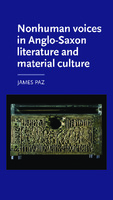Nonhuman voices in Anglo-Saxon literature and material culture
| dc.contributor.author | Paz, James | |
| dc.date.accessioned | 2017-05-01 23:55:55 | |
| dc.date.accessioned | 2019-12-03 08:32:13 | |
| dc.date.accessioned | 2020-04-01T13:31:30Z | |
| dc.date.available | 2020-04-01T13:31:30Z | |
| dc.date.issued | 2017 | |
| dc.identifier | 631090 | |
| dc.identifier | OCN: 992562058 | en_US |
| dc.identifier.uri | http://library.oapen.org/handle/20.500.12657/31338 | |
| dc.description.abstract | "Anglo-Saxon ‘things’ could talk. Nonhuman voices leap out from the Exeter Book Riddles, telling us how they were made or how they behave. The Franks Casket is a box of bone that alludes to its former fate as a whale that swam aground onto the shingle, and the Ruthwell monument is a stone column that speaks as if it were living wood, or a wounded body. In this book, James Paz uncovers the voice and agency that these nonhuman things have across Anglo-Saxon literature and material culture. He makes a new contribution to ‘thing theory’ and rethinks conventional divisions between animate human subjects and inanimate nonhuman objects in the early Middle Ages. Anglo-Saxon writers and craftsmen describe artefacts and animals through riddling forms or enigmatic language, balancing an attempt to speak and listen to things with an understanding that these nonhumans often elude, defy and withdraw from us. But the active role that things have in the early medieval world is also linked to the Germanic origins of the word, where a þing is a kind of assembly, with the ability to draw together other elements, creating assemblages in which human and nonhuman forces combine. Nonhuman voices in Anglo-Saxon literature and material culture invites us to rethink the concept of voice as a quality that is not simply imposed upon nonhumans but which inheres in their ways of existing and being in the world. It asks us to rethink the concept of agency as arising from within groupings of diverse elements, rather than always emerging from human actors alone." | |
| dc.language | English | |
| dc.relation.ispartofseries | Manchester Medieval Literature and Culture | |
| dc.subject.classification | thema EDItEUR::2 Language qualifiers::2A Indo-European languages::2AC Germanic and Scandinavian languages::2ACB English::2ACBA Anglo-Saxon / Old English | en_US |
| dc.subject.classification | thema EDItEUR::D Biography, Literature and Literary studies::DS Literature: history and criticism::DSA Literary theory | en_US |
| dc.subject.classification | thema EDItEUR::D Biography, Literature and Literary studies::DS Literature: history and criticism::DSB Literary studies: general::DSBB Literary studies: ancient, classical and medieval | en_US |
| dc.subject.other | beowulf | |
| dc.subject.other | material culture | |
| dc.subject.other | franks casket | |
| dc.subject.other | anglo-saxon | |
| dc.subject.other | middle ages | |
| dc.subject.other | exeter book | |
| dc.subject.other | aldhelm | |
| dc.subject.other | st cuthbert | |
| dc.subject.other | thing theory | |
| dc.subject.other | dream of the rood | |
| dc.subject.other | Grendel's mother | |
| dc.subject.other | Kingdom of Northumbria | |
| dc.subject.other | Old English | |
| dc.subject.other | Runes | |
| dc.title | Nonhuman voices in Anglo-Saxon literature and material culture | |
| dc.type | book | |
| oapen.identifier.doi | 10.26530/OAPEN_631090 | |
| oapen.relation.isPublishedBy | 6110b9b4-ba84-42ad-a0d8-f8d877957cdd | |
| oapen.relation.isFundedBy | a897f645-c917-4be8-a0db-e8b3f64cac47 | |
| oapen.relation.isbn | 9781526115997 | |
| oapen.pages | 248 | |
| oapen.remark.public | Relevant Wikipedia pages: Anglo-Saxons - https://en.wikipedia.org/wiki/Anglo-Saxons; Beowulf - https://en.wikipedia.org/wiki/Beowulf; Cuthbert - https://en.wikipedia.org/wiki/Cuthbert; Franks Casket - https://en.wikipedia.org/wiki/Franks_Casket; Grendel's mother - https://en.wikipedia.org/wiki/Grendel%27s_mother; Kingdom of Northumbria - https://en.wikipedia.org/wiki/Kingdom_of_Northumbria; Old English - https://en.wikipedia.org/wiki/Old_English; Runes - https://en.wikipedia.org/wiki/Runes | |
| oapen.identifier.ocn | 992562058 |

